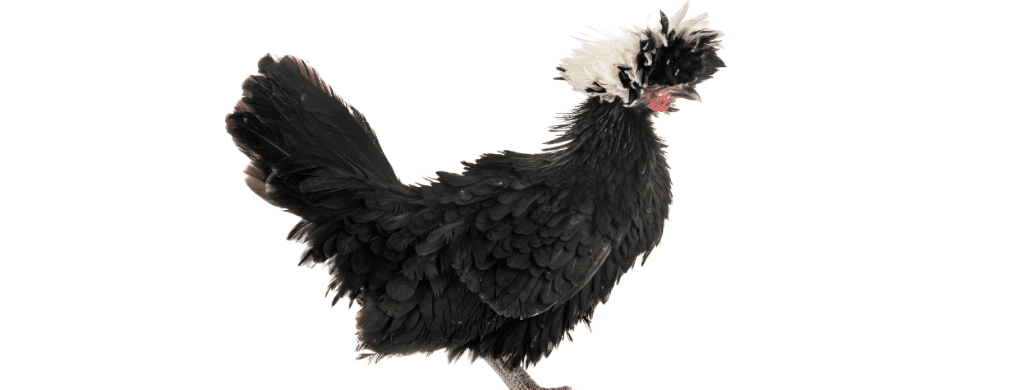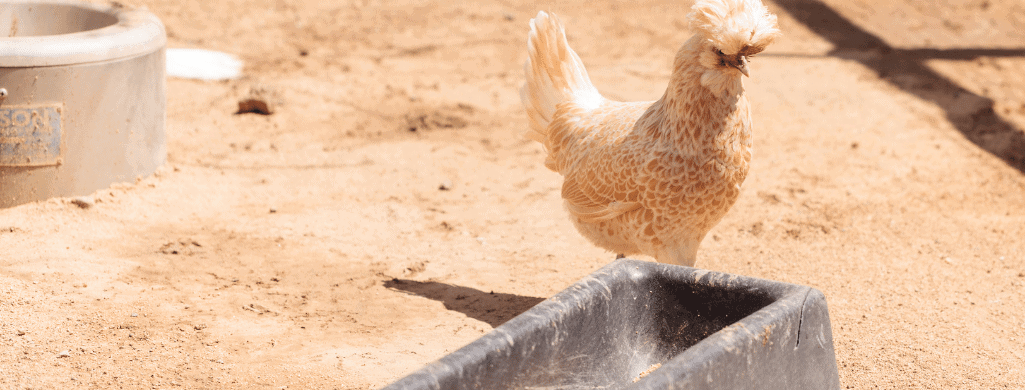Polish chickens are famous for their beautiful plume of feathers, and they are also fairly decent egg layers.
But many people report having issues with raising this chicken breed.
The main reasons Polish chickens are hard to raise are their health issues and very poor eyesight. Their poor eyesight makes this breed more vulnerable to predators, and their health concerns mean these chickens can suddenly become sick.
In this article, we will explain everything backyard chicken keepers need to know about the issues with raising these ornamental birds.
We will also be providing you with some tips for raising Polish roosters and hens. Let’s dive right in!

Table of Contents
ToggleWhat’s Challenging About Raising Polish Chickens?
Raising a Polish flock of chickens is somewhat difficult for many keepers. The first issue many chicken keepers face with a Polish backyard flock is the breed’s health issues.
Unfortunately, the Polish breed is not the healthiest type of chicken out there.
They tend to be particularly vulnerable to injuries and infections.
Polish chicks are often born with skull abnormalities as well.
This makes them even more vulnerable and prone to developing further health complications.
Additionally, this breed of chickens has incredibly poor eyesight.
This leaves Polish chickens much more vulnerable to predators.
It also leaves Polish hens more vulnerable to being attacked by aggressive breeds of chickens.
So, if you live in an area with many predators around or if you have other breeds of chickens in your backyard who are known to be more aggressive, you are likely to have issues with keeping Polish hens.
Common Health Concerns For Polish Chickens
Sadly, Polish chickens are affected by some common issues concerning their health. Here are some of the most common health issues affecting the Polish breed.
Injuries and Infection
Polish chickens are prone to injuries and infection. Being one of the most docile breeds, these backyard chickens are often bullied by more aggressive breeds like Rhode Island chickens.
As a result, Polish chickens can easily get injuries and infections when paired with more assertive chickens or aggressive chickens.
They will likely experience feather loss as a result of this as well.
Eye Problems
Polish varieties of chickens have notoriously poor vision, and these vision issues are one of the main reasons why these backyard chickens are so vulnerable to predators and other aggressive chickens.
Polish hens are particularly vulnerable when you have a stronger, aggressive rooster on your hands.
Further Reading: How To Tell If A Polish Chicken Is A Rooster Or A Hen

Skull Abnormalities
Polish chickens have a noticeable bony head prominence.
While this bony prominence is usually completely fine when the chicken is an adult, this unique head crest will leave Polish chicks particularly vulnerable.
This is because Polish chicks will have a vaulted skull containing a soft spot leaving them with a head similar to the head of a newborn human baby.
This soft spot on the top of their head means the chicks could easily perish if their head gets hit or pecked in any way.
Bumblefoot
Bumblefoot is an infection causing swelling and pain in a chicken’s foot. This infection requires treatment to improve in most cases, and severe bumblefoot infections could quickly become life-threatening.
Most of the time, Polish chickens will get this infection after their feet have been pecked at or injured.
However, other causes, such as obesity and decreased blood supply, occasionally cause this condition in Polish chickens as well.
Lice and Mites
Polish chickens are also vulnerable to parasitic infections like lice and mites. This is mainly thanks to all of their extra feathers, which are hospitable to these pests.
However, doing things like always keeping their living conditions clean and always providing your backyard chickens with fresh water will help prevent your Polish chickens from getting parasites.
Similarly, it is crucial for you to frequently check your Polish chickens for signs of infestation.
Do this by regularly looking out for abnormal symptoms and checking for abnormalities such as clumps of feathers and feather loss.
Are Polish Chickens a Beginner-Friendly Breed?
While not a meat bird, the Polish breed is a good chicken for eggs.
Related Post: Are Polish Chickens Good For Eating?
Similarly, their docile temperament makes these an excellent choice for those looking for backyard chickens.
This breed of chicken is also great for showing at county fairs thanks to their visual appeal and eye-catching crest of feathers on their heads.
However, when paired with other chicken breeds, Polish chickens tend to be fairly low in the pecking order.
As a result, more assertive chickens could easily bully or harm them. Their poor vision also makes the Polish chicken vulnerable to predators.
Polish chickens are a bit difficult to raise for brand-new chicken keepers.
While their docile nature is preferable for new chicken raisers, this breed is prone to health issues and attacks from other animals.
They are also not the most cold-hardy chicken breed out there.
As a result, Polish chickens are best for chicken keepers with some experience already under their belt.
They are also not recommended for those with a mixed flock.

Are There Positives to Raising the Polish Breed?
While many chicken keepers can come across issues with raising the Polish breed varieties, there are some positives to these backyard chickens.
For starters, the Polish breed is known to be fairly docile as long as they are not frightened or feel threatened.
This can make these birds a great choice for those with children and well-behaved pets.
Furthermore, Polish hens are fairly reliable egg layers.
These hens tend to lay three to four eggs a week, so even though they are not necessarily prolific egg layers, they will lay enough to satisfy most backyard chicken keepers.
Further Reading: All You Need To Know About Polish Chicken Eggs
What Type of Housing is Ideal for a Polish Chicken?
These backyard chickens do not need very much space, but you need to give them at least 4’ square feet per bird in the coop.
You will also need to ensure these chickens are well protected from predators by putting up chicken wire or thick fencing around their outdoor space.
This beautiful bird also requires a warm and dry coop or indoor area, as they can easily get frostbite in the cold or develop complications when they get wet.
Thanks to their soft and luxurious coat of feathers, these backyard chickens tend to have trouble drying when their feathers get wet.
As a result, you need to keep Polish chickens inside during the colder months, especially if you live in a particularly cold and snowy climate.
The same is true for those who live in areas with a lot of rain.
What do Polish Chickens Need in Their Diet?
This breed of backyard chickens does not require much special care regarding their diet. In fact, an average chicken feed containing 16% protein will be best for these chickens most of the time.
Of course, you will also need to provide all your backyard chickens with clean water.
These wonderful birds will need chicken feed containing 20% protein during their molt season.
It’s best to change their feed to a molt-specific feed for a few months or add protein supplements to their usual feed.
Polish chickens need this extra protein to bulk up their luxurious feathers in preparation for winter.
Further Reading: Can Polish Chickens Free Range?
Are Polish Chickens Sensitive to the Cold?
Yes, Polish chickens are very sensitive to the cold. This is especially true if you frequently experience damp winters in your area.
Polish chickens are cold-sensitive because the soft feathers are not good at keeping them warm.
Even their gorgeous plume of head feathers won’t help.
Further Reading: Polish chickens in cold weather and how to help
How useful was this post?
Click on a star to rate it!
We are sorry that this post was not useful for you!
Let us improve this post!
Tell us how we can improve this post?
